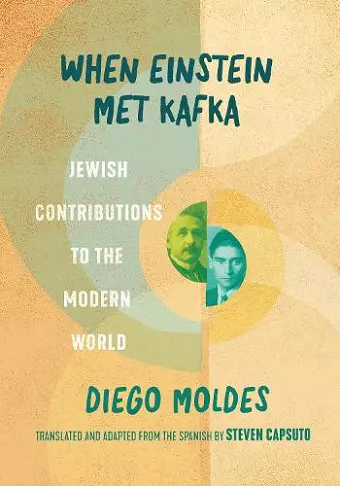When Einstein Met Kafka
Jewish Contributions to the Modern World
Diego Moldes author Steven Capsuto editor
Format:Hardback
Publisher:Mandel Vilar Press
Published:30th Oct '25
Should be back in stock very soon

In April 1911, Prague artists, writers, and intellectuals often gathered nightly at the Café Louvre, an intellectual center where music was played and high-level discussions were held. Many of the attendees were German-speaking Jews, such as Franz Kafka and his faithful friend Max Brod, Hugo Bergmann, Oskar Kraus, Franz Werfel, the mathematician Georg Pick, and a new arrival to the city, thirty-two-year-old Albert Einstein. Is it possible that Kafka and Einstein met and exchanged ideas? Did they influence each other from a philosophical or deep-thinking perspective? In neither Kafka's nor Einstein’s correspondence there is not even the slightest mention of each other. But Einstein and Kafka, two icons of our modern era, serve as the starting point for this book on the enormous contributions in the fields of the empirical sciences, humanities, letters, and arts by individuals of Jewish origin in modernity. In this book, the reader will encounter numerous names in the pages that all spring from the fountainhead of these two antecedents, the Einsteinian and the Kafkian.
While Jews account for 0.2 percent of the world’s population and no more than 2.5 percent of any country except Israel, they have made some of the greatest contributions to Western Culture in diverse fields that range from physics and philosophy to music and art. One register of these contributions is the Nobel Prizes: from their first recipients in 1901, 26 percent of awardees in the Nobel’s six fields — among them, physics, physiology/medicine, and economics — have been Jews. What accounts for the extraordinary breadth of these achievements? This is a question that Diego Moldes examines in When Einstein Met Kafka.
His answers include the history of Jewish culture itself, whether religious or secular, with its emphasis on literacy, learning, and especially inquiry and questioning. Until the European Enlightenment in the 18th century, Jews did not have full citizenship and civil rights — they were barred from universities, from government, and from entire professions. The Enlightenment opened the doors!
Despite the outbreaks of violent anti-Semitism — or what Diego Moldes calls Judeophobia — and continuing discrimination in all Western countries, Jews now had legal rights, and they persevered. In a near-encyclopedic fashion, he profiles just how thousands of individual Jews, by name, made original contributions...
“This landmark contribution by a leading cultural historian, Diego Moldes, is an original achievement: the fullest and most historically grounded study of Jewish intellectual and cultural achievements and contributions. It fills a gap in the worldwide literature, at the very moment that it addresses urgent issues of the place of diverse Jewish peoples in their own contexts, especially today’s challenges not only to larger understandings but to contemporary everyday lives.”—Harvey J. Graff, comparative social and cultural historian, Professor Emeritus of English and History, Ohio State University, is the author of The Literacy Myth, Literacy and Social Development in the West and Searching for Literacy: The Social and Intellectual Origins of Literary Studies
“There is no book like this one, which examines the contributions of Jews as individuals (not as a religious people) to all fields of knowledge.”—Stuart Weitzman, World Renowned Shoe Designer and Entrepreneur
ISBN: 9781942134398
Dimensions: 254mm x 177mm x 44mm
Weight: unknown
700 pages